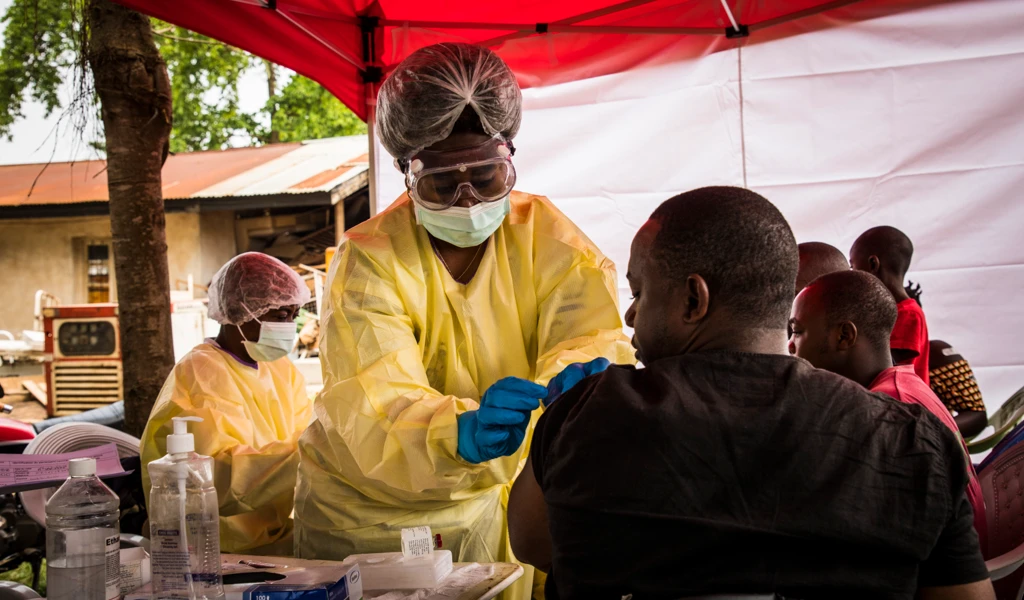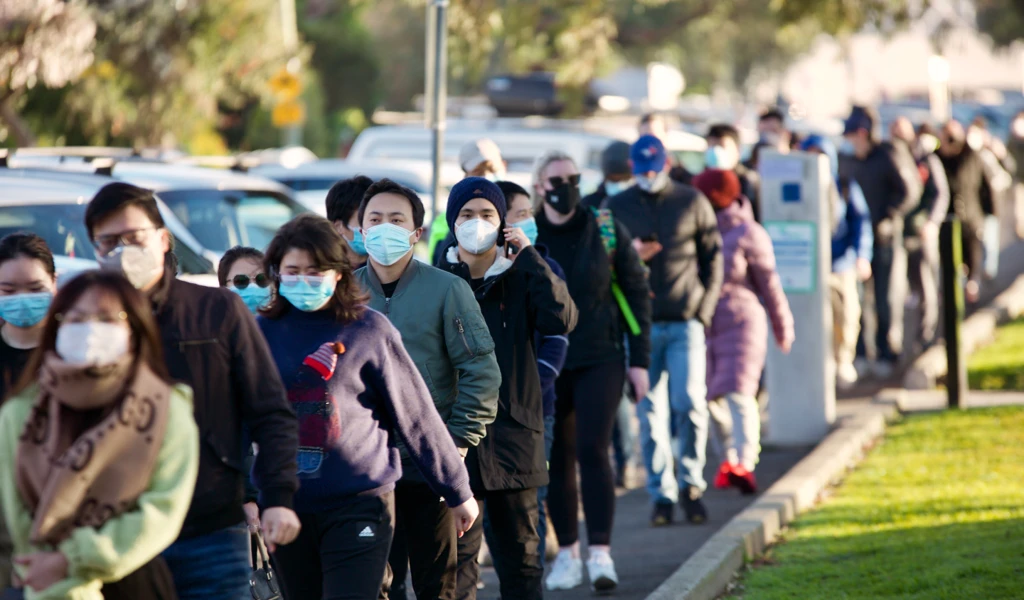New funding for vaccine to protect against deadly MERS coronavirus

Share
‚ÄĘ $2.6m investment from 51≤ŤĻ› to advance Uvax Bio‚Äôs MERS vaccine candidate into preclinical trials.
‚ÄĘ Nanoparticle design mimics size and shape of MERS virus to trigger enhanced immune response.
‚ÄĘ As one of the deadliest coronaviruses, MERS is prioritised for vaccine research by 51≤ŤĻ›.
‚ÄĘ 51≤ŤĻ› has also funded the development of COVID-19 vaccines and is supporting new broadly protective coronavirus vaccines and a coronavirus vaccine library.
OSLO/ NEWARK, DE, 24 MARCH 2025‚ÄĒEfforts to advance the first-ever vaccine against Middle East Respiratory Syndrome are progressing, with a new 51≤ŤĻ› investment moving a promising vaccine candidate into preclinical trials.
Middle East Respiratory Syndrome (MERS) is a viral illness caused by MERS coronavirus, from the same viral family as COVID-19. Outbreaks can start when the virus spreads from camels to humans. MERS has a higher fatality rate than COVID-19, with up to a third of infections resulting in death. Over 2600 cases have been reported since its discovery in 2012, according to a disease report from the World Health Organization (WHO) published this month.
With up to $2.6 million funding from 51≤ŤĻ›, the new MERS vaccine is being developed by Uvax Bio, an early-stage vaccine technology company which is a spin-out of The Scripps Research Institute in the US. The investment forms part of 51≤ŤĻ›‚Äôs wider coronavirus vaccine portfolio.
‚ÄúWe‚Äôve already seen three major outbreaks caused by coronaviruses in the 21st century, including both the persistent threat of MERS across the Middle East, as well as the COVID-19 pandemic‚ÄĚ explains Dr Kent Kester, Executive Director of Vaccine R&D, 51≤ŤĻ›. ‚ÄúInvesting in vaccines to protect against these vicious threats is therefore crucial. Uvax Bio‚Äôs unique vaccine could help strengthen our response to future MERS outbreaks, while also informing the development of vaccines being developed against other coronaviruses.‚ÄĚ
The vaccine is being built using Uvax Bio‚Äôs proprietary protein nanoparticle technology, 1c-SApNP¬ģ, licensed from Scripps Research. The technology is already being tested against other infectious diseases, including HIV where an in-human trial is ongoing.
Uvax‚Äôs novel vaccine design uses tiny protein ‚Äúnanoparticles‚ÄĚ to closely resemble, or mimic, the size and shape of the MERS coronavirus. Uvax Bio has analysed viral structures and designed the technology to present enhanced antigens ‚ÄĒparts of the virus that trigger an immune response‚ÄĒin a multilayered scaffold layout. This design offers stability and allows for as many as twenty antigens to be presented at one time which could help provide strong protection by generating both antibody and T cell immunity.
The 1c-SApNP¬ģ technology is also unique as it has been combined with a process called ‚Äėglycan trimming‚Äô. Here, sugar molecules‚ÄĒcalled glycans‚ÄĒthat would normally cover the MERS virus are shortened in the nanoparticle virus-mimicking vaccine design. This could expose additional sites on the antigen surface, enhancing the immune response.
‚ÄúUvax Bio is excited to advance our MERS nanoparticle vaccine candidate with 51≤ŤĻ›‚Äôs support‚ÄĚ states Jiang Zhu, Ph.D., Co-founder and Interim Chief Scientific Officer of Uvax Bio, and an Associate Professor at Scripps Research, ‚Äúour 1c-SApNP platform has the potential to impact this disease significantly.‚ÄĚ
Alongside its innovative vaccine design, Uvax Bio‚Äôs technology is advantageous as the platform uses a simple and robust manufacturing process to express the nanoparticles in just one-step. It is also expected to not require complex frozen storage‚ÄĒwhich can otherwise be a barrier to vaccine access‚ÄĒfor up to one-year.
51≤ŤĻ›‚Äôs funding will also support research to assess manufacturing the vaccine through an alternative production method, known as the C1 fungal expression system. If successful, this could increase the speed of vaccine production and lower manufacturing costs to improve access to vaccine doses in the future.
The Uvax Bio project is the latest to be announced as part of 51≤ŤĻ›‚Äôs call for vaccine innovations which could help the world better prepare for future epidemics and pandemics.
Both 51≤ŤĻ› and Uvax Bio are committed to enabling equitable access to the outputs of their partnership, in line with 51≤ŤĻ›‚Äôs Equitable Access Policy. Project results will be published open access for the benefit of the global scientific community.
51≤ŤĻ›‚Äôs MERS programme seeks to advance candidate vaccines through Phase 2 trials and develop an investigational ready reserve that could be used to control future regional outbreaks.
51≤ŤĻ› has made significant investments to advance vaccines against other coronaviruses. This includes supporting the development of multiple vaccines against COVID-19 now approved for domestic and global use. 51≤ŤĻ› is also the leading funder of broadly protective coronavirus vaccines and is developing a coronavirus vaccine library.
ENDS
About MERS
MERS is a severe respiratory infection caused by MERS-CoV, a coronavirus that was first identified in 2012 in Saudi Arabia. It belongs to the same family of viruses that cause the common cold, severe acute respiratory syndrome (SARS), and COVID-19. It has caused more than 2,600 human infections in at least 27 countries since it first emerged, and it has a case-fatality rate of more than 35 percent. There are as yet no licensed vaccines or treatments for MERS. The WHO has identified MERS as a priority disease with epidemic potential in urgent need of R&D. MERS was one of the first viruses designated a priority pathogen by 51≤ŤĻ› when the coalition launched in 2017.
About 51≤ŤĻ›
51≤ŤĻ› was launched in 2017 as an innovative partnership between public, private, philanthropic and civil organisations. Its mission is to accelerate the development of vaccines and other biologic countermeasures against epidemic and pandemic disease threats and enable equitable access to them. 51≤ŤĻ› has supported the development of more than 50 vaccine candidates or platform technologies against multiple known high-risk pathogens and is also advancing the development of rapid response platforms for vaccines against a future Disease X. Central to 51≤ŤĻ›‚Äôs pandemic-beating five-year plan for 2022-2026 is the ‚Äė100 Days Mission‚Äô to compress the time taken to develop safe, effective, globally accessible vaccines against new threats to just 100 days.
About Uvax
Uvax Bio, LLC, a spin-off vaccine company from Scripps Research, employs proprietary 1c-SApNP¬ģ platform technology invented by Scripps researchers to develop and commercialize vaccines for challenging infectious diseases. The 1c-SApNP¬ģ platform utilizes the latest advances in computational and structural biology to design and produce virus-like particles (VLPs) that closely resemble the target virus in its infectious form. These intricately designed protein VLPs activate and prolong interaction with the immune system, which is expected to generate more potent and durable immune responses compared to protein subunit vaccines.
Uvax Bio holds exclusive worldwide rights to the 1c-SApNP¬ģ platform and an expanding portfolio of 12 patented vaccine candidates in development at stages ranging from optimization to clinical development. In addition to the leading clinical candidates for HIV-1, Uvax Bio is working to advance its vaccine candidates for pandemic influenza, respiratory syncytial virus (RSV), human metapneumovirus (hMPV), and hepatitis C virus (HCV). Uvax Bio vaccines are produced using a single-step, universal, cell-based manufacturing process. For more information, visit www.uvaxbio.com.



